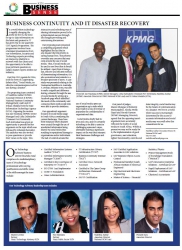KZN Business Sense - Business Continuity and IT Disaster Recovery:KPMG2016-06-22 In a world where technology is rapidly changing the world we live in, the need for up-to-date information on the latest and greatest in IT has given rise to our quarterly CIO Agenda Programme. The programme involves focus orientated presentations from our Information, Security and Technology experts providing an interactive platform to network with our clients and the opportunity to be able to pose pertinent questions to subject matter experts within our industry.
Our first CIO Agenda for 2016, took the form of a captivating debate titled, “Social Media, an effective communications tool for use during a disasterâ€. The proposing team consisted of Nashikta Authar (KPMG Associate Director & KPMG National Business Continuity Management Lead) and Dr Irshad Abdulla from the State Information Technology Agency (SITA). Opposing the motion was Ian Nyamusa (KPMG Senior Manager) and Litha Dalindyebo (Transnet Port Terminals). Each individual was given an opportunity to present his/her argument on the topic which was followed by rebuttals thereafter. The audience was also invited to pose questions or provide their views on the topic. This interactive and refreshing way of sharing information proved to be a phenomenal success through the thought-provoking and entertaining discussions. Our proposing team presented a compelling argument which highlighted the fact that in any disaster the first priority is saving human lives. This priority overrides any concerns that may exist around the use of social media. Thus, if social media can be used to save lives then it should be utilised. Apart from it being a fast, effective and efficient method of disseminating information, it is also economical and extends to a broader spectrum of users. A case study was presented relating to the Tasmanian bushfires in Australia. A civilian, Melanie Irons, was able to make a significant difference during a disaster through the use of social media by setting up a Facebook page which identified the needs of the community and connected them with people who were able to provide assistance. Our opposition’s argument focused on social media usage in South Africa considering the current landscape. There have been instances where disasters were created through the use of unsolicited information being shared via social media thus resulting in reputational damage to organisations and/or individuals. The lack of controls around the use of social media opens an organisation up to risks which may result in a loss of revenue or jeopardise the confidentiality of organisational data. Social media clearly had its pros and cons, and it is certainly refreshing to be able to assist in challenging someone’s views, ultimately making a significant impact on the way they interpret their businesses challenges and strategies. Our panel of judges, Mazwi Shongwe (eThekwini Municipality), Akisha Welsh (Spar) and Farouk Kareem (KPMG Managing Director), agreed that the opposing team’s argument more accurately reflected the reality of social media in South Africa. Whilst at present we may not be ready for it, the implementation of good governance, user education, tighter functionality controls and data integrity, social media may be the future of communication in a disaster. We live in a world where success is increasingly determined by the access to accurate information and social media may very well solve this conundrum for us. Nashikta Authar (Associate Director & National BCM Lead) 082 719 1368 nashikta.authar@kpmg.co.za |
KZN Business Sense - Business Continuity and IT Disaster Recovery:KPMG
Copyright © 2024 KwaZulu-Natal Top Business
